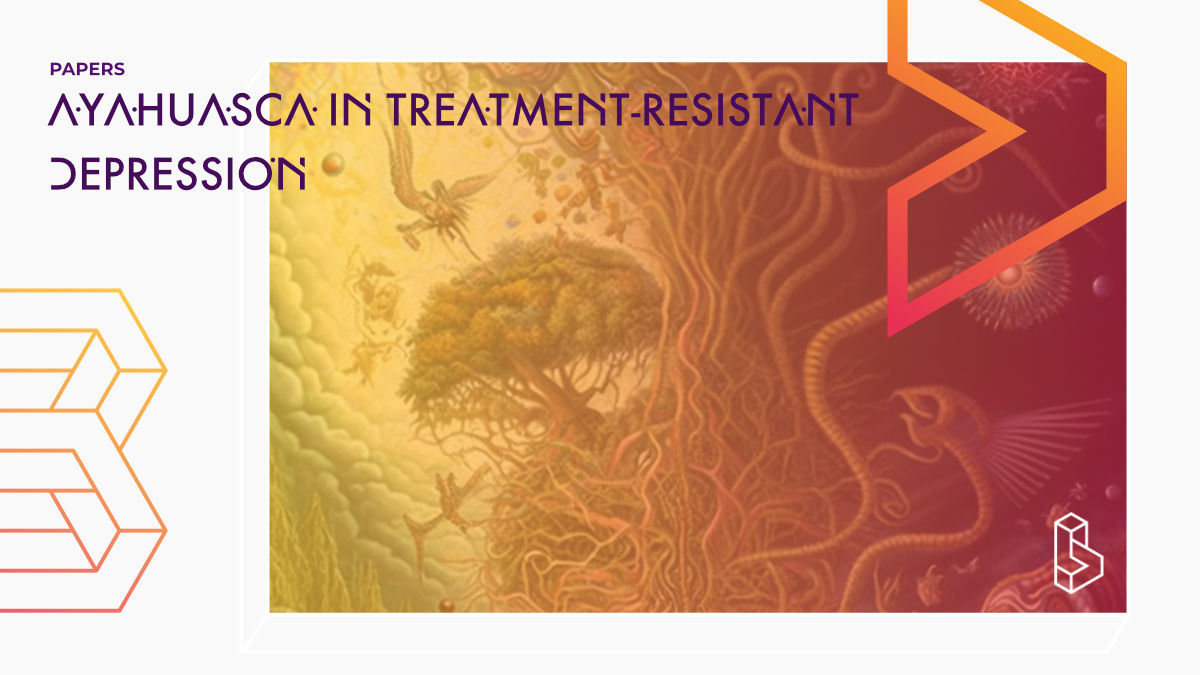This randomized placebo-controlled trial investigated the antidepressant efficacy of ayahuasca (25.2mg/70kg DMT, 130.2mg/70kg harmine, 16.8mg/70kg harmaline, 84mg/70kg tetrahydroharmine) in patients with depression. While both groups exhibited improvements in depression, between-group effect sizes increased throughout the week, yielding a significantly higher response rate in the ayahuasca group after a week.
Abstract
“Background: Recent open-label trials show that psychedelics, such as ayahuasca, hold promise as fast-onset antidepressants in treatment-resistant depression.
Methods: To test the antidepressant effects of ayahuasca, we conducted a parallel-arm, double-blind randomized placebo-controlled trial in 29 patients with treatment-resistant depression. Patients received a single dose of either ayahuasca or placebo. We assessed changes in depression severity with the Montgomery-Åsberg Depression Rating Scale (MADRS) and the Hamilton Depression Rating scale at baseline, and at 1 (D1), 2 (D2), and 7 (D7) days after dosing.
Results: We observed significant antidepressant effects of ayahuasca when compared with placebo at all-time points. MADRS scores were significantly lower in the ayahuasca group compared with placebo at D1 and D2 (p = 0.04), and at D7 (p < 0.0001). Between-group effect sizes increased from D1 to D7 (D1: Cohen’s d = 0.84; D2: Cohen’s d = 0.84; D7: Cohen’s d = 1.49). Response rates were high for both groups at D1 and D2, and significantly higher in the ayahuasca group at D7 (64% v. 27%; p = 0.04). Remission rate showed a trend toward significance at D7 (36% v. 7%, p = 0.054).
Conclusions: To our knowledge, this is the first controlled trial to test a psychedelic substance in treatment-resistant depression. Overall, this study brings new evidence supporting the safety and therapeutic value of ayahuasca, dosed within an appropriate setting, to help treat depression.”
Authors: Fernanda Palhano-Fontes, Dayanna Barreto, Heloisa Onias, Katia C. Andrade, Morgana M. Novaes, Jessica A. Pessoa, Sergio A. Mota-Rolim, Flávia L. Osório, Rafael Sanches, Rafael G. dos Santos, Luís Fernando Tófoli, Gabriela de Oliveira Silveira, Mauricio Yonamine, Jordi Riba, Francisco R. Santos, Antonio A. Silva-Junior, João C. Alchieri, Nicole L. Galvão-Coelho, Bruno Lobão-Soares, Jaime E. C. Hallak, Emerson Arcoverde, João P. Maia-de-Oliveira & Dráulio B. Araújo
Notes
This paper is included in our ‘Top 10 Articles on Psychedelics in the Treatment of Depression‘
This paper is included in the meta-analytical review by Galvão-Coelho and colleagues (2021) that found psychedelics to improve mood (for those with mood disorders) both in the short and long-term (up to 60 days).
Summary
Study details
Compounds studied
Ayahuasca
Topics studied
Depression
Study characteristics
Original
Placebo-Controlled
Double-Blind
Randomized
Participants
29
Humans
Authors
Authors associated with this publication with profiles on Blossom
Fernanda Palhano Xavier de FontesFernanda Palhano Xavier de Fontes is a research engineer at the Brain Institute, UFRN. Her main areas of interest are psychedelics, psychiatry, and neuroimaging techniques such as fMRI and electroencephalography.
Luís Tófoli
Luís Tófoli is a professor at UNICAMP and one of the organizers of ICARO, his work is mostly done in Brazil and focused on ayahuasca.
Institutes
Institutes associated with this publication
University Federal of Rio Grande do NorteUniversity Federal of Rio Grande do Norte research with psychedelics has been taking place for the past ten years and more.
University of São Paulo
The University of São Paulo has been conducting research with psychedelics for many years, with a focus on ayahuasca given its traditional use in Brazil.
Compound Details
The psychedelics given at which dose and how many times
Placebo 0.36 mg | 1xLinked Research Papers
Notable research papers that build on or are influenced by this paper
The Impact of Ayahuasca on Suicidality: Results From a Randomized Controlled TrialThis analysis of a double-blind, parallel-arm, randomized placebo-controlled trial (n=29) investigates the impact of ayahuasca on suicidality (SI) in individuals with treatment-resistant depression (TRD). It found that ayahuasca may show potential as a fast-acting and innovative intervention for SI but didn't find significant results (only a trend with a large effect size). This is the first study to investigate ayahuasca for SI.
Linked Clinical Trial
Antidepressant Effects of Ayahuasca: a Randomized Placebo Controlled Trial in Treatment Resistant DepressionThe purpose of the present trial is to test the efficacy of Ayahuasca in treatment-resistant depression.

